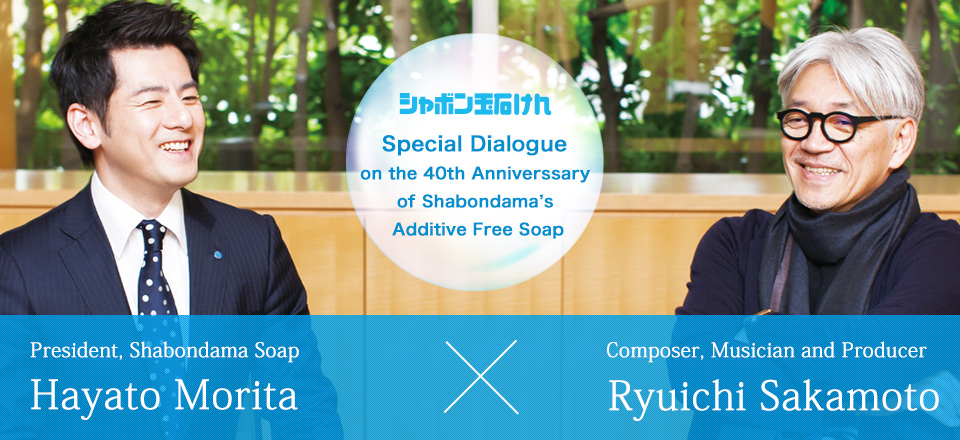Shabondama Soap and Ryuichi Sakamoto cross paths once again,
fifteen years after LIFE a Ryuichi Sakamoto Opera 1999.
During this time, the environmental issues that affect us and our way of thinking have undergone gradual changes.
This year marks the 40th anniversary of Shabondama Soap ceasing the sale
of synthetic detergents and switching to the manufacture and sale of additive-free soaps.
What exactly does “protecting our health and the environment” mean?
A candid dialogue session was held between these two individuals that have earnestly confronted this challenge.
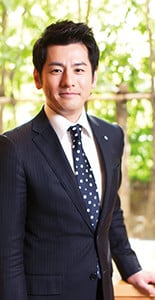
We’ll always be a company that embraces humanity and nature.
Hayato Morita
Born in Fukuoka Prefecture in 1976. Joined Shabondama Soap upon graduation from the Department of Business Administration at Senshu University. Oversaw product development, and sales to wholesalers and department stores. Appointed Vice President and Director in 2002. Became company president in March 2007. Concurrently serves as President of Shabondama Sales, Shabondama Honpo, and Shabondama Kikaku.
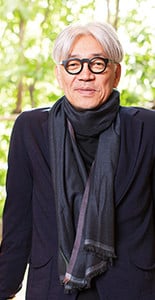
It is ok for environmental consciousness to be driven by self-interest.
Ryuichi Sakamoto
Born in Tokyo in 1952. Completed the master's program at Tokyo University of the Arts. Formed the Yellow Magic Orchestra (YMO) in 1978. Received the Academy Award for Best Original Score in 1988. In addition to his musical endeavors, he has proactively addressed environmental issues, including founding "more trees," an organization that promotes forest conservation and afforestation. He has also continued to advocate for societal issues, such as support for the Great East Japan Earthquake recovery and propositions for the abolition of nuclear power plants and nuclear disarmament.
The first encounter, Ryuichi Sakamoto opera “LIFE” 15 years ago
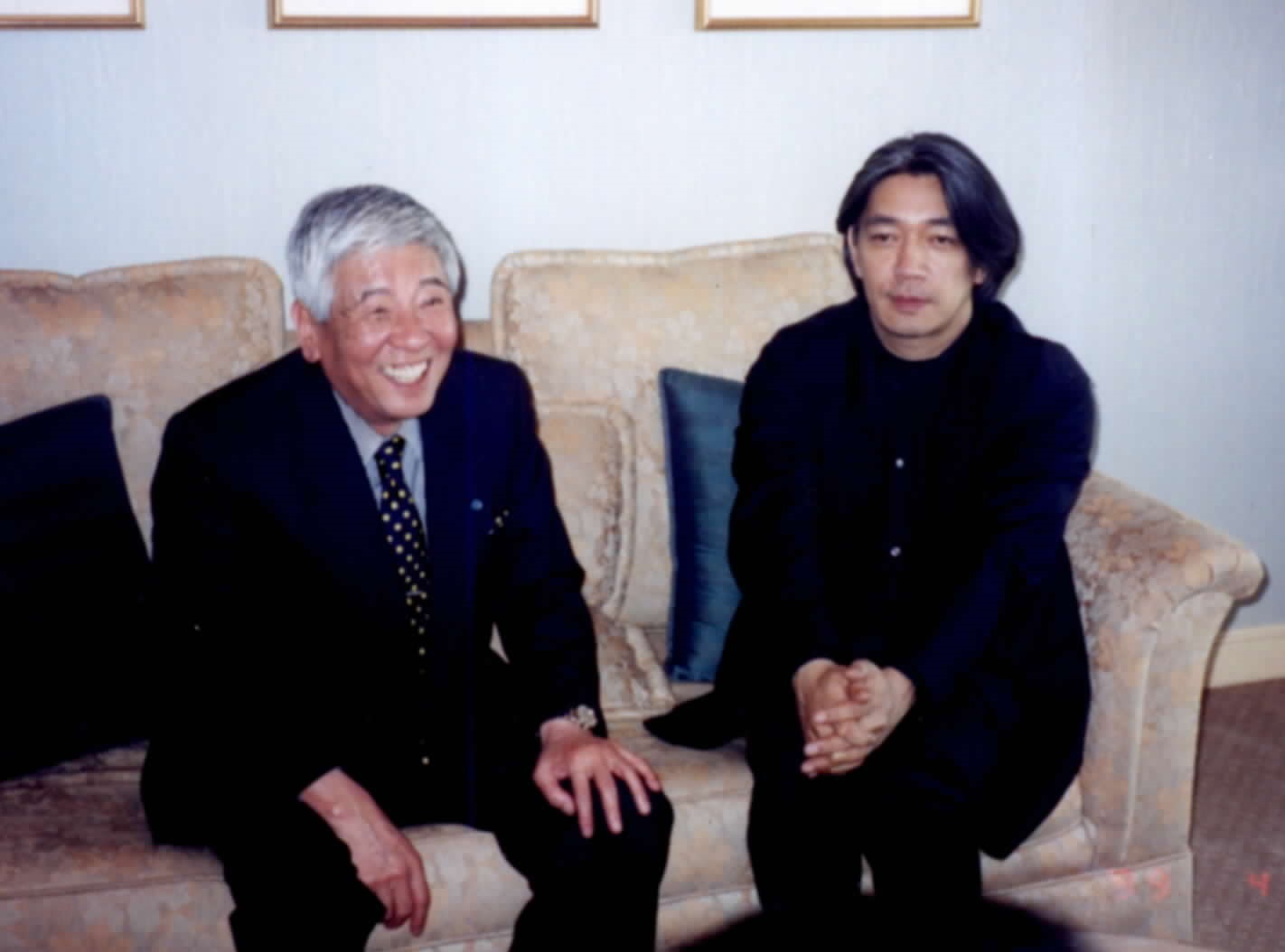
Ryuichi Sakamoto with former President Mitsunori Morita, April 1999
Sakamoto It was a fan letter that led to my discovery of Shabondama Soap. It’s been already 15 years since then. At the time, I was working on an opera about environmental issues when I received the letter which said, “There is an environmentally friendly additive-free soap”. This came as quite a surprise, as I was under the impression that soaps were all the same. As soon as I could, I got hold of “The Natural Way ‘Soap’ Handbook”, authored by the soap’s creator, former president, the late Mitsunori Morita, president Hayato Morita’s father, and I was really inspired.
Morita Then, our company had the honor of being a special sponsor for LIFE a Ryuichi Sakamoto Opera 1999, centered in the theme of “symbiosis”. I was still a student and saw the performance, but to be honest, it was difficult for me to understand it.
Sakamoto So has the manufacturing process remained unchanged for 40 years?
Morita Yes, we have not changed it. While there are manufacturing methods that can shorten production time to between 4 to 5 hours, they inevitably require additives. Our soaps must be 100% additive-free.
Sakamoto I’ve also been using Shabondama Soap’s products for 15 years with a peace of mind.
Morita Even if our soaps flow into rivers or the sea, they will break down into water and carbon-dioxide in a short amount of time. Soap scum is a potential nutrient source for microorganisms that eventually become food for fish. There is only a single line in the ingredients section of our soaps that reads “soap base”. There are no other unnecessary ingredients. Despite the high production cost due to the meticulous manufacturing process and the non-usage of additives, we will never compromise on our production method and product quality. That is why it is said that there is no equivalent to our product anywhere in the world.
Sakamoto Even in developed countries, such as the USA, where universal healthcare has not been established, many people are concerned about their health. There is also a growing awareness of environmental considerations. I hope to spread awareness not only in Japan but also across the world about these exceptional soaps, crafted with such meticulous care and a high consciousness towards the environment.
Eco-friendly practices, to ease health-related concerns for oneself and one's family.
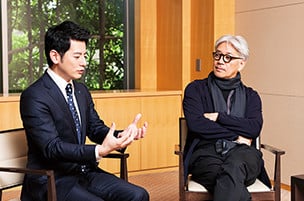
Sakamoto I believe that environmental consciousness and concern for the environment starts from personal awareness. I got interested in these issues when I was around 40, when I felt an almost sudden significant drop in my physical fitness. I drank frequently, and stayed up late at night, and work was busy as always, but for the first time in my life I became conscious of what I consumed, my surroundings, or simply put, the environment. The change in my own body made conscious to these, and in that sense, I believe that I may share a similar kind of experience to that of President Morita's father.
Morita Indeed, my father also experienced the difference between synthetic detergents and soap through his body firsthand.
Sakamoto I started reading books earnestly, trying to figure out what kind of relationship my body had with the environment. Which is why I say, “my desire for environmental consciousness is driven by self-interest”. It’s hard to relate with something we consider distant such as the earth or some environment far away. But we do desire for ourselves and our children to live healthy lives, eat good food, and drink clean water.
Morita Your opinion that “environmental consciousness is driven by self-interest”, makes a lot of sense. We receive many comments and feedback from our customers daily, and the most common kind of inquiries are about products that address their own pressing concerns or anxieties related to their skin problems. With so much information out there, I can’t help but hope that everyone carefully chooses the correct information.
Sakamoto They say that young people these days are no longer driving cars, or buying televisions. White-collar workers commute by bicycle with backpacks on their backs. Environmental attitudes may be slowly changing. Unlike our way of living in the civilization of the 20th century, living a secure and careful life feels good, doesn’t it? In New York, where I live, you can choose the type of electricity you want to have transmitted, such as 'wind power,' 'thermal power,' 'solar power,' or a combination, through contracting with an electric company. It really does feel good to be using electricity created by nature, such as wind and solar. I experience my surroundings through every step that I take, and my senses. We are after all also a part of nature, and I want to value that.
Companies, like individuals, should adhere to an honest approach in their dealings
Morita Although I inherited this business from my father, I feel a stronger sense of responsibility running the company every year, and at the same time to safeguard the continuity of our soaps. Whenever I receive a letter of gratitude, such as “My family uses this soap everyday”, or “We finally found a soap that we can use on our children with a peace of mind”. I feel a sense of mission to continue delivering safe and reliable products.
Sakamoto Exactly. We hope that companies like Shabondama Soap will continue to supply safe and reliable products. Legally, a company is a corporate entity, but in essence it is regarded to have a personality, just like a person. There is deep trust in companies that display a strong sense of integrity and responsibility. On the other hand, with the spread of the Internet, for example, if a company uses environmentally unfriendly materials or conceals child labor somewhere on the planet, even if it makes a flashy and cool TV commercial advertising its products as eco-friendly, someone will find out about the fact and share it on the Internet, and the information will reach consumers around the world. Companies should be aware that in this era, when citizens’ voices and consumer sentiment are powerful, honesty is paramount.
Morita It is important to think of our customers and ourselves as the same consumers. Our employees are quite sensitive to issues related to skin health and the safety of their children. We make sure never to forget that based on what we do every day, there are customers at the other end. The primary cause of pollution in rivers, lakes, and seas is household wastewater. Using the very detergents that are a cause of pollution can’t be good for humans. We have been convinced for 40 years and have been working on manufacturing additive-free soaps that are friendly to both the environment and people since early on. Even during the long years when our conviction was not understood by others, we fought for the survival of our company. The seriousness of our efforts was finally understood by our customers. Companies are responsible for delivering products that are good for the environment and health and must be leaders in tackling environmental issues. We will continue to be a company that promotes a lifestyle that is in harmony with nature.
LIFE a ryuichi sakamoto
opera 1999
LIFE a Ryuichi Sakamoto Opera
Shabondama Soap & Ryuichi Sakamoto

In 1999, Ryuichi Sakamoto created and performed the opera LIFE, under the theme of “symbiosis” between humans and the environment. As this theme resonated with Shabondama Soap, the company became a special sponsor of the opera. His journey to better understand the meaning of “symbiosis”, took him to Mongolia, where he observed how humans coexisted with the land. Livestock graze on grass, their dung is decomposed by bacteria, enriching the soil for more grass to grow. This entire cycle relies on what meagre grass there is, grass which humans are unable to survive directly on. Livestock consume this grass and are in turn consumed by humans. The opera aimed to convey the message that like the delicate symbiosis maintained by the earth, humans should recognize their interconnectedness with nature and avoid having a human-centric perspective.
The opera LIFE* was an avant-garde production that featured a groundbreaking stage which utilized a massive screen that was connected to the Internet, displaying multimedia visuals. Along with dancers, singers, orchestras, and choirs from around the world, the use of synthesizers for the music further contributed to the avant-garde nature of the production. Following the performance of this opera, LIFE, his references to environmental issues, peace, and anti-nuclear issues increased. This led to musicians to engage in activities such as supporting landmine removal. The opera became a work through which Ryuichi Sakamoto’s new initiatives became known to the world and was a significant moment in his career.
*The opera LIFE was held at Nippon Budokan from September 9 to 12, 1999, and at Osaka-jo Hall on September 4 and 5, 1999.
